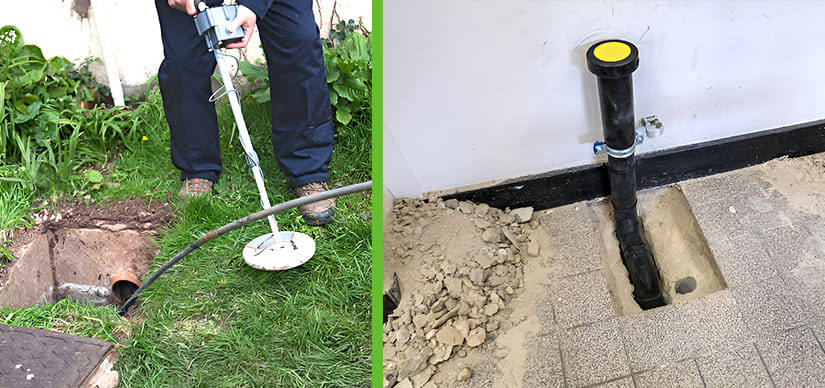What Are Common Causes And Signs of Slab Leak?
Views : 453

There are likely dozens of water and sewage lines running beneath your basement that you have no idea about. These pipes connect to the city’s main water and sewage networks. It’s possible that the water pipes in your slab foundation, designed to provide water to your fixtures without a hitch, will corrode and crack as your home ages.
A water leak in a slab foundation caused by a broken pipe may be difficult. To help you protect your home’s foundation, we’ve compiled a list of the most common reasons for slab leaks and ways to fix them.
What exactly is a slab leak?
The concrete footings that hold up homes are commonly referred to as “slabs.” This concrete slab also contains the gas and sewage lines that supply your home. As the pipes beneath your property age, it is typical for cracks and holes to occur. A pipe just under your slab foundation threatens water seepage if it should burst.
It’s too bad that the soil around it will eventually become saturated with water and cause the ground to quake. If the soil beneath your home becomes too wet and unstable, cracks and deterioration will appear in the concrete slab foundation.
A leaking concrete slab could be the culprit if it is not fixed promptly, which could cause your home’s foundation to shift. Walls and floors would certainly crumble or even collapse as a result.
Causes of slab leaks
Earthquakes
Seismic ground motion is a significant threat to underground plumbing systems. Earthquake shocks can loosen couplings between pipes, causing leaks, but slab leaks become irreparable when pipes below the ground corrode. Lines can be broken or weakened by other factors, such as earth shifting.
Water-like sounds in the home can be used to slab leaks in Mission Viejo. However, a hot area on the floor indicates a problem with the hot water supply. Mildew and mold can quickly spread through a house if water leaks in via a crevice in the concrete slab that serves as the foundation.
Water’s Acidity
Acidic hard water is a problem in several cities and suburbs. The pH of hard water typically varies from 1 to 4. If your area has very acidic water, the pipes that run beneath a slab foundation may corrode and crack over time.
Many homes utilize water softeners to remove the magnesium and calcium naturally occurring in water, thereby alleviating this issue. While a water softener might extend the life of your pipes, it also has the potential to damage the pipes in your home’s foundation.
The average pH of soft water is 9, but it can range from 8 to 14. If the water in your suburb is excessively alkaline, the pipes that support your slab foundation may corrode and leak over time. If your plumbing fittings, such as your tub, sink, and shower, have green or blue stains, you have acidic water.
Breakdown of Plumbing System Made of Copper
Older houses are more prone to slab leaks than newer ones because the pipes in the foundation were probably constructed of copper or Orangeburg.
It is usual for copper pipes to corrode when exposed to conditions that include a high concentration of dissolved salts, water with a pH below 7.0, significant volumes of liquid oxygen, poor grounding of electrical hardware to copper pipes, or excessively alkaline water with a pH above 8.5. If the copper pipes beneath your home’s foundation are ever compromised, it can cause a catastrophic slab leak (cracks or holes).
Abrasion
As water moves through the pipes in your foundation to supply your home’s appliances and sinks, the lines may eventually scrape against the concrete. Tubes can also interact with other pipes, gravel, soil, and other forms of terrain.
When a line begins to rub against a concrete slab, the pipe’s exterior may be damaged due to increased friction. If the surface of your pipes wears too thin, your slab foundation could spring a leak.
High Pressure of Water
You risk having the pipes beneath your slab foundation burst or cave in owing to the weight of the water. Signs of high water pressure include rattling sounds upon activation and dripping faucets.
To determine if the water pressure in your home is too high, you should get a water pressure gauge. Such a water pressure gauge is built to give you precise PSI readings for your pipeline.
There is a wide variation in water pressure from 40 to 80 psi from one city or suburb to another. Possible causes of pipe rupture on your floor include extreme water temperature or pressure. Installing a water pressure-reducing valve on your property is a simple way to protect your pipes from damage in the future.
How to Spot the Signs of a Slab Leak
Wasteful Consumption of Water Resources
If a leak forms in your pipes below the ground, water will begin to seep out and into the soil around your house. The water bill will rise if you have a slab leak and don’t have it addressed immediately by a professional plumber in Mission Viejo.
Low Water Pressure
A significant amount of water could be wasted in the event of a leak in the concrete footing of your home before it reaches your plumbing fixtures. A leak like this could cause low water pressure in your home. A significant water pressure decline after turning off all of the institutions in your home, such as the faucets and shower heads, may indicate a leaky pipe close to the foundation.
Bad Odors
There is an increased risk of mold growth in homes that have carpeting. The carpet pad will soon become soaked if a pipe leaks beneath the floor. Replacement of wet padding is recommended to prevent the growth of mold and mildew. It is not recommended that you use a vacuum to try to extract water from your carpet. The padding in your carpet won’t be dry because most vacuums don’t have enough suction power. To prevent mold and unpleasant odors from spreading, replacing the carpet and padding in the living and dining areas as soon as possible is essential.




